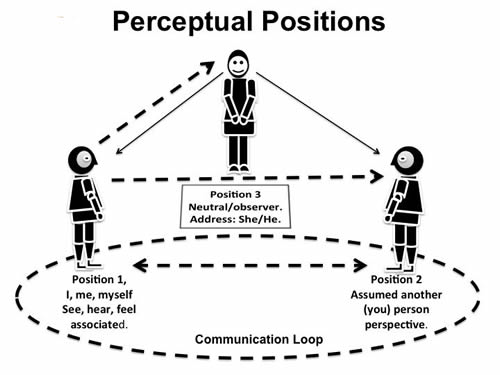I constantly remind our clients that corporations don’t buy. People do. And people buy when they feel a level of trust and feel you understand them,  their values and what they’re trying to achieve, both professionally and personally.
their values and what they’re trying to achieve, both professionally and personally.
Put another way, they feel you’re on their side of the table, co-creating a solution. A “We Space” environment.
Having said that, all sales is about leadership. While on their side of the table you’re leading them through their issues to embracing your solution.
But to lead you must first have rapport and exhibit a level of empathy. See things from your prospect’s point of view, so you understand where they’re coming from.
You may be familiar with the NLP concept of Perceptual Positions.
If not, a simple version is there are 3 main positions.
Position 1 – Self: You see things from your own point of view.
Position 2 – Other: You dissociate and imagine you’re in someone else’s body – where you see and experience things from their point of view.
Position 3 – Observer/Witness: You become an independent observer of both you and the other person where you can watch the interaction from a third party uninvolved point of view.
Let’s look at how a typical sales call works.
Salesperson walks in and after the usual pleasantries, whips out their presentation and launches into it.
It’s all about me, me, me. How wonderful my product or service is. All the features and benefits.
They’re sitting in Position 1 – Self. Everything is from their point of view.
But their prospect often couldn’t care less. They’re just thinking about themselves.
Effective salespeople regularly move between Position 1 – self to Position 2 – Other. Seeing things from their prospect’s point of view. “I don’t care how much you know until I know how much you care”
Being curious about the prospect without any hidden assumptions that they need the product or trying to manipulate them into buying by using clever, leading questions.
Being disassociated allows you to think of what questions to ask, in what order, to help your prospect get the information she needs to convince herself there’s a reason to buy.
Position 2 allows you to think about the underlying meta-message. What are they really saying to you under the surface words.
Most of us intuitively move from Self to Other and back. It’s the basis of all empathy.
Position 3 – Observer/Witness is harder to do. And takes practice. Like an audience in a play or movie, pretend you’re looking at both yourself and the other person. You’ll get a far better sense of whether you’re in rapport and when leading, if the other is following.
Your role is to continually shift between these three positions to check on how the interaction is progressing.
A word of warning.
Effective salespeople have two innate characteristics. Empathy as demonstrated by being able to shift into Position 2 while exhibiting leadership to close the deal.
Empathy can turn into sympathy where you take your prospect’s side to the exclusion of your own. And believe them when they feel they won’t benefit from your product or service when they really would.
Your job is to lead! If it’s truly in their best interest to buy, close the deal. Anything else is doing them a disservice.
Remember, sales is where the rubber hits the road. It’s the only way you will take control of your own business destiny through achieving a steady stream of profitable business, which gives you choices. Both in business and personally.
Our SalesAccelerator™ program teaches you how to close more business, faster.
Call Rashid on 0414 913 334 and set yourself up for a great 2019 – 2020 financial year.
